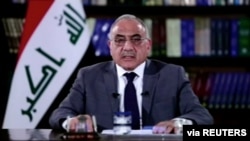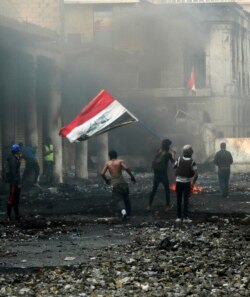Iraq's parliament accepted Prime Minister Adel Abdul Mahdi's resignation Sunday, but the move is not expected to end nearly two months of violent anti-government protests.
Mahdi resigned Friday. President Barham Salih will now ask the largest bloc in parliament to nominate a new prime minister.
But this could lead to weeks of deal-making because it is unclear which coalition of parties make up the largest bloc.
Mahdi and his government have agreed to stay on in a caretaker role until a new prime minister is approved.
Mahdi's resignation is unlikely to satisfy anti-government protesters who have said it is not enough for a new prime minister to take over -- they are demanding changes to the entire political system, which they call corrupt, inept, and does little to help impoverished Iraqis despite the nation’s oil wealth.
"As you know, the political parties in Iraq engaged in corruption, not the person who is the prime minister," Iraqi lawmaker Ahmed al-Jburi tells VOA's Kurdish Service. "The political parties will put someone as the head of government and the political parties who start to engage in corruption and grip on the finances in various sectors."
Al-Jburi says the prime minister’s resignation came about two months too late, saying he should have quit when the first Iraqi protester was killed.
Meanwhile, another demonstrator was killed Sunday when Iraqi security forces fired at marchers to stop them from climbing over the concrete barriers surrounding the parliament building in Baghdad. Nine others were wounded.
The nationwide anti-government protests have killed nearly 400 people and wounded more than 1,000 since early October.






